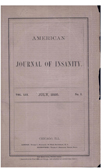Psychotherapists' duties to third parties: Ramona and beyond
Abstract
OBJECTIVE: This paper explores the implications for psychotherapy of a series of court cases involving suspected childhood sexual abuse that have raised the question of when psychiatrists and other psychotherapists can be sued by third parties for their behavior in therapy. METHOD: The authors begin by considering traditional legal approaches that until now, with few exceptions, granted only patients the right to sue caregivers for negligence. Then they turn to Ramona v. Ramona, the most publicized of a new line of cases, in which the California courts allowed a father accused of abusing his daughter to sue his daughter's therapists. RESULTS: The rationale for the abandonment of the previous restrictions on liability in Ramona was that since the father was a "direct victim" of the therapists' negligence, traditional limitations on the therapists' duties toward him should not apply. Related cases have used similar logic. Inherently difficult for the courts to apply, the direct victim standard would leave therapists unclear as to how to avoid duties to third parties, other than by refusing to treat patients with family members who may be potential litigants. Moreover, aggrieved third parties essentially would have the power to bring effective treatment to a halt by filing suit or threatening to do so. CONCLUSIONS: Although concern about therapeutic practices related to memories of childhood abuse may be warranted, abandonment of traditional rules against suits by nonpatients would be ill-advised. In the meantime, therapists can take steps to lessen the probability of their becoming involved in such litigation.
Access content
To read the fulltext, please use one of the options below to sign in or purchase access.- Personal login
- Institutional Login
- Sign in via OpenAthens
- Register for access
-
Please login/register if you wish to pair your device and check access availability.
Not a subscriber?
PsychiatryOnline subscription options offer access to the DSM-5 library, books, journals, CME, and patient resources. This all-in-one virtual library provides psychiatrists and mental health professionals with key resources for diagnosis, treatment, research, and professional development.
Need more help? PsychiatryOnline Customer Service may be reached by emailing [email protected] or by calling 800-368-5777 (in the U.S.) or 703-907-7322 (outside the U.S.).



